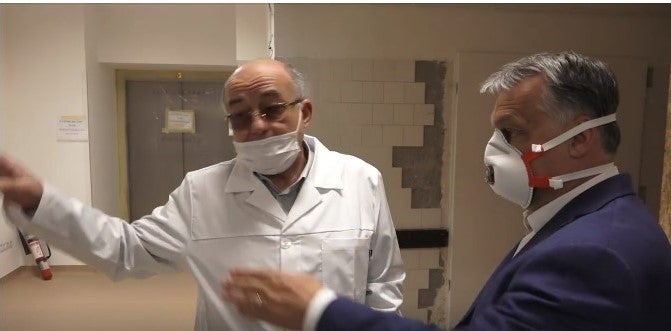The Hidden Danger in Hospitals for Hungary’s Covid-19 Patients

In December, an intensive care doctor was quoted in Hungarian media saying that many of the Covid-19 patient deaths are in fact the result of other infections they picked up during their treatment for the disease in Hungarian public hospitals. That is a shocking but not surprising allegation given the grave problem of hospital- acquired infections in the country. Research by Human Rights Watch published in August shone a light on needlessly high numbers of serious illness and death resulting from hospital-acquired infections in Hungary. We documented the shortcomings of the underfunded and understaffed Hungarian public health care system and how patients risked ending up sicker after hospital treatment than before it. Official statistics on these infections in Hungary are unreliable and incomprehensible, making it challenging at best to understand the scope of the problem. But it’s clear that Hungary isn’t doing enough to address the issue. Infections caused by bacteria are common in healthcare facilities worldwide. But basic things like using hand soap, hand sanitizer, proper cleaning and disinfection products together with adequate training of healthcare professionals, make a huge difference in reducing these infections and avoiding deaths from them. In Hungary, however, the authorities have been doing precious little to address hospital- acquired infections. Hand soap, hand sanitizer and toilet paper are generally not provided in public hospitals, and many hospitals require patients to bring their own. Cleaning is poor and isolation of infectious patients inadequate. Broken toilets and washbasins are common, making hygiene more difficult to maintain. Conditions like these create excellent breeding grounds for these potentially deadly bacteria even during normal times. Add a deadly pandemic, which has led to the hospitalization of thousands of people, many in intensive care, and it becomes clear how the Covid-19 pandemic exacerbates the risk of hospital-acquired infections spreading. A patient who was among the first confirmed Covid-19 cases in Hungary told Human Rights Watch in December about their unhygienic encounter with the Hungarian health care system.
The person said they were admitted for nearly three weeks in a Budapest hospital, in a dirty room, without soap or hand sanitizer. Garbage was removed only every three to four days, with food contents left in the overfull bin. A cleaner mopped the floor every three or four days. “I was scared all along that I would contract some disease in the dirty and unhygienic environment I was forced to stay in,” the person said. “Is this what I pay taxes for?” As far as the researchers could determine, that patient was able to avoid a hospital-acquired infection. Instead of fixing glaring flaws in public health care, the Hungarian authorities seem to go out of their way to keep people in the dark.
The human resources minister has ordered healthcare workers not to speak to the media, More than 130 people have been arrested for “fear mongering” and spreading “fake news” during a pandemic. And journalists, human rights defenders and concerned citizens can’t access crucial information about the pandemic and Hungary’s response to it. Prime Minister Viktor Orban was filmed interrupting a doctor who was saying there were not enough trained staff to operate ventilators. During online news conferences, the authorities routinely ignore questions from journalists regarding the government’s pandemic response. Human Rights Watch ran into similar difficulties when approaching authorities for information for our August report. Yet now, with thousands of people experiencing hospital hell, and over 12.000 dead, it will be increasingly difficult for the government to hide cold facts from the Hungarian people. Recently, the Hungarian government has taken some overdue steps toward improving health care. It raised salaries for doctors and nurses in December, and criminalized the use of so-called “gratuity money” – under-the-table payments to health care professionals – both much needed steps to keep professionals in the country and to combat corruption in public health care. Rather than trying to cover up the dangers in its hospitals, the government should build on efforts to make them safe. Increasing state funding for basic hygiene and cleaning products in hospitals would pay dividends in reducing the risk of people leaving sicker than they arrived, or not leaving at all. And it would also reinforce efforts to stop the spread of Covid-19.
Read the full article at the original website
References:
- https://444.hu/2020/12/07/sok-beteg-nem-kozvetlenul-a-koronavirusba-hal-bele-hanem-az-intenziv-osztalyon-kapott-kulonfele-fertozesekbe
- https://www.hrw.org/news/2020/08/04/hungary-health-care-failures-endanger-lives
- https://hclu.hu/en/articles/last-year-was-another-year-when-more-people-died-due-to-hospital-infections-than-in-car-accidents
- https://444.hu/2020/04/26/az-emmi-utasitasba-adta-a-korhazaknak-hogy-a-jarvany-ugyeben-ne-nyilatkozzanak
- https://index.hu/belfold/2020/07/15/rendorseg_statisztika_koronavirus_jarvany_buntetoeljarasok/
- https://www.hrw.org/news/2020/08/24/witness-mothers-hungarian-hospital-hell
- https://koronavirus.gov.hu/cikkek/459-fovel-emelkedett-beazonositott-fertozottek-szama-es-elhunyt-89-beteg
